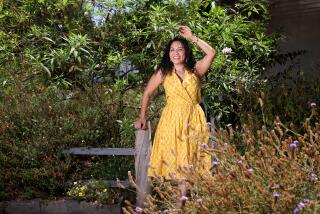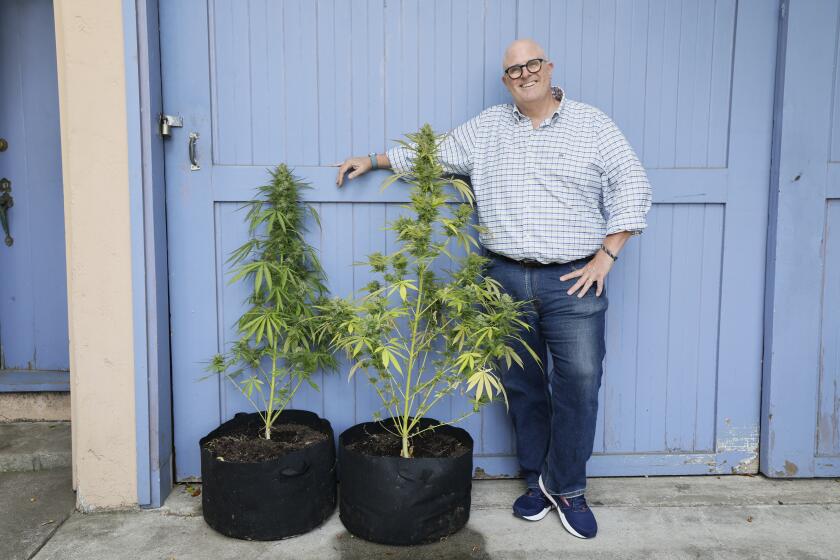Organic nursery grows as people go back to basics
Jimmy Williams planted his first seeds when he was 4 years old. Fifty-three years later, he’s still playing in the dirt.
It might be difficult to find someone with a heritage more deeply connected to growing things than Williams.
His stretches back to a great-grandmother who, as a slave about to be shipped to a new owner in South Carolina, decided that the one thing she couldn’t do without was the handful of tomato seeds she hid in a skirt pocket. It goes back further, to the west coast of Africa somewhere near modern-day Sierra Leone, where Williams’ ancestors possessed a talent for growing rice better than anyone else.
Now, the transplant from New York’s Long Island is in Los Angeles catering to recession-weary residents who find savings and solace in planting their own gardens. Williams’ business -- Hayground Organic Gardening and Garden Design -- grows the seedlings, teaches clients how to nurture them and even maintains the gardens if the customer wishes.
“It just fascinates me, how a seed can germinate and grow into something you can eat,” Williams, 57, said. “It just gives me a sense of renewal.”
Lately, he is hardly the only one who finds it fascinating. Despite the punishing economic downturn, Williams said his business appeared to be headed for its best year ever.
Williams and his 23-year-old son and partner, Logan, have moved the nursery from a garage rooftop in Hancock Park to a much more spacious lot in Silver Lake. In the last year, his staff has grown from eight mostly part-timers to about 13. And at local farmers markets where he reaches many of his customers, there is barely a pause in business.
Among the crowd on a recent morning in Santa Monica were restaurant owners, professional chefs and culinary arts students searching for just the right ingredients. Some customers arrive like giddy apprentices returning with evidence of their first good work.
“I put one of their blueberry bushes into the ground and suddenly I had tons of blueberries, big fat tasty blueberries better than I can buy in a store,” said Kim Uchida, 49, who teaches seventh-grade science. Of the Williams duo, she added, “They’re not just knowledgeable. They’re entertaining. They always have a good story to tell.”
Maybe the best of those stories is of how Hayground Organic Gardening and Garden Design was almost the small business that never was. But Williams is also a lucky guy. He’s got enough charm to have persuaded friends at various crucial stages to throw in with him and help move the business forward.
Eleven years ago, for example, Williams was in fashion design, with his own label and a couple of Manhattan storefronts that featured his sweaters and other knitwear. Williams, who never went to college “because I needed to go to work,” wasn’t really thinking about growing plants until a friend with dreams of a Manhattan rooftop garden asked for his help in putting one together.
Williams was happy to do it.
“Some of the best gardens in the country are on rooftops in Manhattan,” Williams said.
The garden featured raised redwood plant beds and all kinds of vegetables and flowers. For Williams, it rekindled his connection to gardening, which had begun at an early age out of necessity.
“I was the second of 13 children. We gardened for food. We gardened or we would die. It was about growing food to have something to eat, but it was also just fun,” he said.
Even then, in New York, Williams had a large collection of seeds, including the family’s heirloom tomato, Goose Creek. The heirloom designation is a distinction that comes, Williams said, only after a plant’s seeds have been kept and nurtured for at least 50 years.
His friend, a writer, said he needed to put a seed catalog together. When he balked, she offered to write one for him.
“She inspired me to go into business. She did my first catalog,” Williams said.
Years later, Williams’ business would get another boost. Living in Los Angeles, he lacked that perhaps most basic of all pieces of gardening equipment -- a truck. Williams rode to jobs as far apart as Venice and the San Fernando Valley by bus, carrying his tools and seeds in sacks.
One of Williams’ customers was a life coach. Soon they were bartering, his garden skills for her advice on his business, including a contact for acquiring a truck and a van.
Now, with the recession in full bloom, Williams finds his business thriving.
It took in more than $175,000 last year. This year, Williams said, is even busier. At the downtown Santa Monica Farmers Market recently, one buyer wrote out a check for 26 blueberry bushes, at $110 each.
Williams said people are putting in gardens to combat the uncertainty of the economic times.
“This is one thing people can do,” he said. “They can grow their own food. Then they realize how much better it tastes and how much money they can save.”
Logan Williams has noticed something else. The clientele has shifted from mainly a 50-and-older crowd a few years ago to people of all ages and backgrounds.
Part of the draw is the unique range of offerings. There’s a waiting list of 600 customers for the Goose Creek heirloom tomato plants and brisk demand for -- as Jimmy Williams tells it -- descendants of the mint plant Bob Marley used to brew tea on his porch in Jamaica.
Williams’ help in building a garden can run from hundreds of dollars to a few thousand dollars, depending on how much the soil needs to be enhanced with ingredients such as potting soil, alfalfa and chicken manure. It’s an expertise customers seem to trust.
One such customer was Nyesha Arrington, who came to the farmers market for help starting a garden at Cache, a restaurant in Venice where she is executive chef.
“They have gorgeous stuff here, and they are super-knowledgeable and personable,” Arrington said.
Williams has plans to reach a broader audience. He wants to open a retail nursery. And he has an agent, an editor, a contract and a book title. It’s called “Seeds to Skillet.”
“I think I have a pretty good story to tell,” he said.
--







